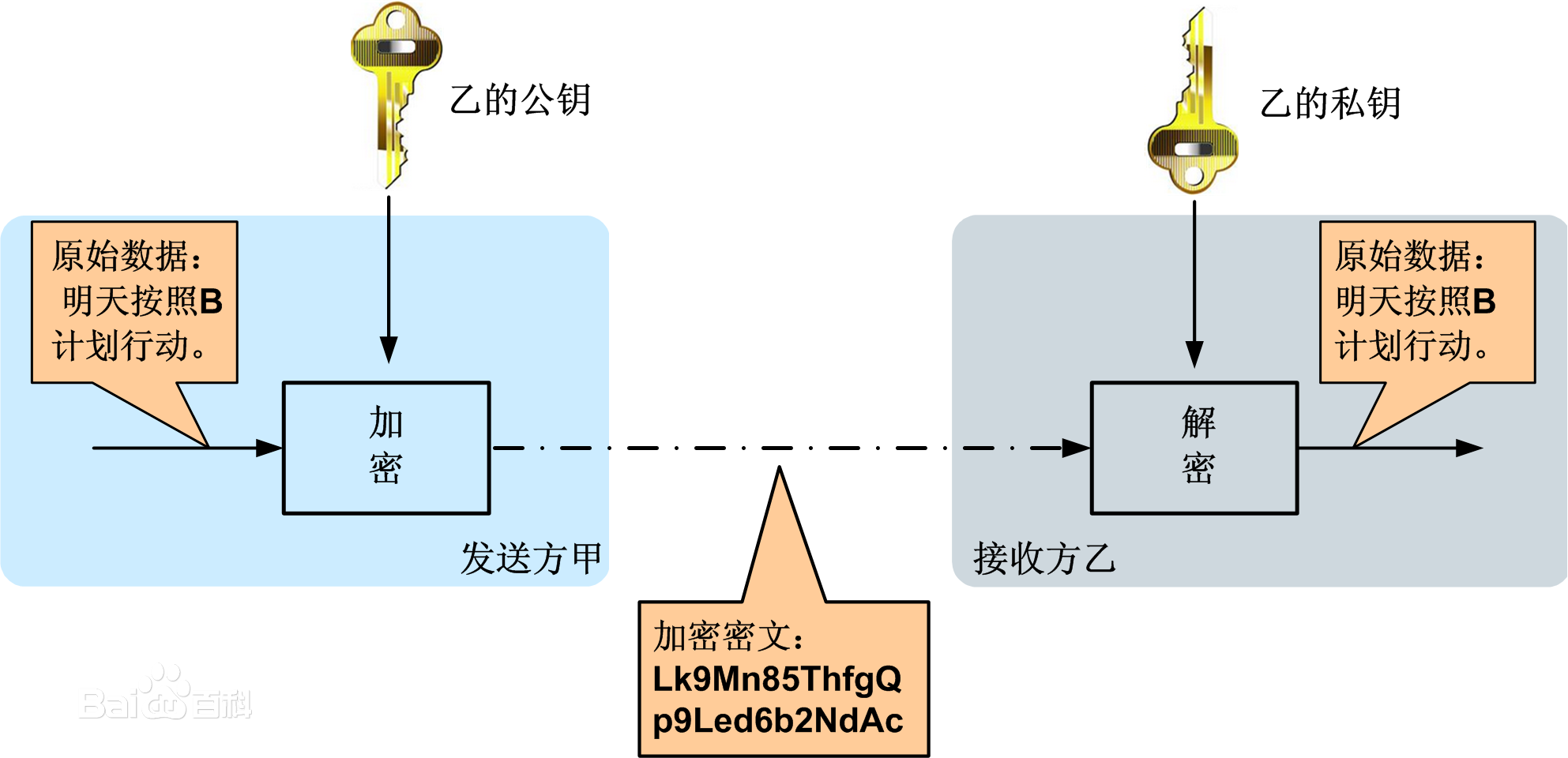浅谈PHP中的多种加密技术及代码示例
作者:网络转载 发布时间:[ 2015/11/2 14:48:25 ] 推荐标签:软件测试技术 php web测试
同样是一道面试答错的问题,面试官问我非对称加密算法中有哪些经典的算法? 当时我愣了一下,因为我把非对称加密与单项散列加密的概念弄混淆了,所以更不用说什么非对称加密算法中有什么经典算法,结果当然也让面试官愣了一下,所以花点时间说说PHP中的信息加密技术
信息加密技术的分类
单项散列加密技术(不可逆的加密)
属于摘要算法,不是一种加密算法,作用是把任意长的输入字符串变化成固定长的输出串的一种函数
MD5
string md5 ( string $str [, bool $raw_output = false ] ); //MD5加密,输入任意长度字符串返回一个的32位字符
md5()为单向加密,没有逆向解密算法,但是还是可以对一些常见的字符串通过收集,枚举,碰撞等方法破解;所以为了让其破解起来更麻烦一些,所以我们一般加一点盐值(salt)并双重MD5;
md5(md5($password).'sdva');
sdva是盐值,该盐值应该是随机的,比如md5常用在密码加密上,所以在注册的时候我会随机生成这个字符串,然后通过上面的方法来双重加密一下;
Crypt
很少看到有人用这个函数,如果要用的话有可能是用在对称或非对称的算法里面,了解一下既可;
string crypt ( string $str [, string $salt ] ) //第一个为需要加密的字符串,第二个为盐值(是加密干扰值,如果没有提供,则默认由PHP自动生成);返回散列后的字符串或一个少于 13 字符的字符串,后者为了区别盐值
<?php
$password='testtest.com';
echo crypt($password);
//输出:$1$DZ3.QX2.$CQZ8I.OfeepKYrWp0oG8L1
/*第二个$与第三个$之间的八个字符是由PHP生成的,每刷新一次变一次
*/
echo "<hr>";
echo crypt($password,"testtest");
//输出:tesGeyALKYm3A
//当我们要加自定义的盐值时,如例子中的testtest作为第二个参数直接加入, 超出两位字符的会截取前两位
echo "<hr>";
echo crypt($password,'$1$testtest$');
//输出:$1$testtest$DsiRAWGTHiVH3O0HSHGoL1
/*crypt加密函数有多种盐值加密支持,以上例子展示的是MD5散列作为盐值,该方式下
盐值以$1$$的形式加入,如例子中的testtest加在后两个$符之间,
超出八位字符的会截取前八位,总长为12位;crypt默认是这种形式。
*/
echo "<hr>";
//crypt还有多种盐值加密支持,详见手册
Sha1加密:
string sha1 ( string $str [, bool $raw_output = false ]); //跟md5很像,不同的是sha1()默认情况下返回40个字符的散列值,传入参数性质一样,第一个为加密的字符串,第二个为raw_output的布尔值,默认为false,如果设置为true,sha1()则会返回原始的20 位原始格式报文摘要
<?php
$my_intro="zhouxiaogang";
echo sha1($my_intro); // b6773e8c180c693d9f875bcf77c1202a243e8594
echo "<hr>";
//当然,可以将多种加密算法混合使用
echo md5(sha1($my_intro));
//输出:54818bd624d69ac9a139bf92251e381d
//这种方式的双重加密也可以提高数据的安全性
非对称加密
非对称加密算法需要两个密钥来进行加密和解密,这两个秘钥是公开密钥(public key,简称公钥)和私有密钥(private key,简称私钥);

如图所示,甲乙之间使用非对称加密的方式完成了重要信息的安全传输。
乙方生成一对密钥(公钥和私钥)并将公钥向其它方公开。
得到该公钥的甲方使用该密钥对机密信息进行加密后再发送给乙方。
乙方再用自己保存的另一把专用密钥(私钥)对加密后的信息进行解密。乙方只能用其专用密钥(私钥)解密由对应的公钥加密后的信息。
在传输过程中,即使攻击者截获了传输的密文,并得到了乙的公钥,也无法破解密文,因为只有乙的私钥才能解密密文
同样,如果乙要回复加密信息给甲,那么需要甲先公布甲的公钥给乙用于加密,甲自己保存甲的私钥用于解密。
在非对称加密中使用的主要算法有:RSA、Elgamal、背包算法、Rabin、D-H、ECC(椭圆曲线加密算法)等。 其中我们见的算法是RSA算法
以下是从网上摘抄的一段PHP通过openssl实现非对称加密的算法
<?php
/**
* 使用openssl实现非对称加密
* @since 2010-07-08
*/
class Rsa {
/**
* private key
*/
private $_privKey;
/**
* public key
*/
private $_pubKey;
/**
* the keys saving path
*/
private $_keyPath;
/**
* the construtor,the param $path is the keys saving path
*/
public function __construct($path) {
if (empty($path) || !is_dir($path)) {
throw new Exception('Must set the keys save path');
}
$this->_keyPath = $path;
}
/**
* create the key pair,save the key to $this->_keyPath
*/
public function createKey() {
$r = openssl_pkey_new();
openssl_pkey_export($r, $privKey);
file_put_contents($this->_keyPath . DIRECTORY_SEPARATOR . 'priv.key', $privKey);
$this->_privKey = openssl_pkey_get_public($privKey);
$rp = openssl_pkey_get_details($r);
$pubKey = $rp['key'];
file_put_contents($this->_keyPath . DIRECTORY_SEPARATOR . 'pub.key', $pubKey);
$this->_pubKey = openssl_pkey_get_public($pubKey);
}
/**
* setup the private key
*/
public function setupPrivKey() {
if (is_resource($this->_privKey)) {
return true;
}
$file = $this->_keyPath . DIRECTORY_SEPARATOR . 'priv.key';
$prk = file_get_contents($file);
$this->_privKey = openssl_pkey_get_private($prk);
return true;
}
/**
* setup the public key
*/
public function setupPubKey() {
if (is_resource($this->_pubKey)) {
return true;
}
$file = $this->_keyPath . DIRECTORY_SEPARATOR . 'pub.key';
$puk = file_get_contents($file);
$this->_pubKey = openssl_pkey_get_public($puk);
return true;
}
/**
* encrypt with the private key
*/
public function privEncrypt($data) {
if (!is_string($data)) {
return null;
}
$this->setupPrivKey();
$r = openssl_private_encrypt($data, $encrypted, $this->_privKey);
if ($r) {
return base64_encode($encrypted);
}
return null;
}
/**
* decrypt with the private key
*/
public function privDecrypt($encrypted) {
if (!is_string($encrypted)) {
return null;
}
$this->setupPrivKey();
$encrypted = base64_decode($encrypted);
$r = openssl_private_decrypt($encrypted, $decrypted, $this->_privKey);
if ($r) {
return $decrypted;
}
return null;
}
/**
* encrypt with public key
*/
public function pubEncrypt($data) {
if (!is_string($data)) {
return null;
}
$this->setupPubKey();
$r = openssl_public_encrypt($data, $encrypted, $this->_pubKey);
if ($r) {
return base64_encode($encrypted);
}
return null;
}
/**
* decrypt with the public key
*/
public function pubDecrypt($crypted) {
if (!is_string($crypted)) {
return null;
}
$this->setupPubKey();
$crypted = base64_decode($crypted);
$r = openssl_public_decrypt($crypted, $decrypted, $this->_pubKey);
if ($r) {
return $decrypted;
}
return null;
}
public function __destruct() {
@fclose($this->_privKey);
@fclose($this->_pubKey);
}
}
相关推荐

更新发布
功能测试和接口测试的区别
2023/3/23 14:23:39如何写好测试用例文档
2023/3/22 16:17:39常用的选择回归测试的方式有哪些?
2022/6/14 16:14:27测试流程中需要重点把关几个过程?
2021/10/18 15:37:44性能测试的七种方法
2021/9/17 15:19:29全链路压测优化思路
2021/9/14 15:42:25性能测试流程浅谈
2021/5/28 17:25:47常见的APP性能测试指标
2021/5/8 17:01:11













 sales@spasvo.com
sales@spasvo.com